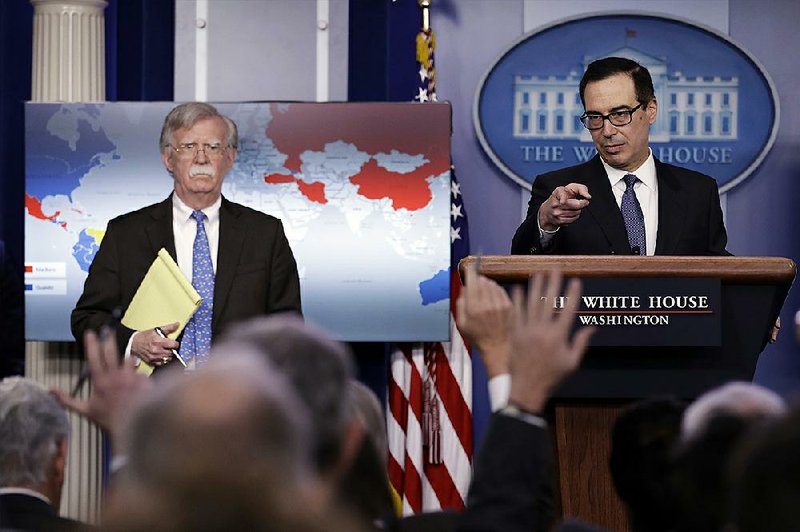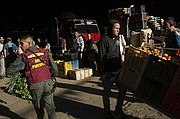WASHINGTON -- President Donald Trump's administration imposed economic sanctions Monday on the state-owned oil company of Venezuela.
The new sanctions, announced at the White House by national security adviser John Bolton and Treasury Secretary Steven Mnuchin, are designed to weaken President Nicolas Maduro and strengthen the hand of Juan Guaido, the opposition leader of the National Assembly, whom the United States recognized last week as interim president of Venezuela.
Under the sanctions, Maduro's government would lose access to one of its most important sources of income and foreign currency, along with about $7 billion in assets of Petroleos De Venezuela S.A.
Hours after the White House announced the sanctions, Maduro accused the United States of robbing Venezuelans of oil riches that rightfully belong to them.
In a message to Trump televised Monday on state TV, Maduro said, in English, "Hands off Venezuela!"
Maduro said he would announce measures in response to the U.S. sanctions, which he called "immoral, criminal." He had provided no details as of Monday night.
Guaido late Monday confirmed that he had spoken with Trump "and other presidents in the region," though he didn't provide any details on when the conversations took place or what was discussed. He told CNN en Espanol only that his talks with heads of state have focused on resolving Venezuela's humanitarian crisis and restoring democracy.
Guaido rejected accusations from Maduro and others that the U.S. is staging a coup, saying Venezuelan citizens are simply exercising their constitutional rights.
He also noted that the National Assembly this month approved a measure asking foreign nations to ensure the country's assets aren't "looted" by Maduro. The National Assembly is now the only branch of Venezuela's government recognized by the U.S. and other nations.
Mnuchin said the U.S. "is holding accountable those responsible for Venezuela's tragic decline."
"As we've said in the past, the purpose of sanctions is to change behavior," he said, adding that when there are "rightful leaders" in Venezuela, "then indeed that money will be available to Guaido."
The Trump administration also ordered U.S. companies doing business with Venezuela to divert payments to special blocked accounts. That order will affect Citgo, the Venezuelan-owned, Houston-based oil company, and Valero, the American oil refiner that is the largest in the United States. Both companies will be able to continue importing crude oil from Venezuela as long as the payments do not go to Maduro's government.
Depending on how Maduro responds, the new sanctions could have little effect on U.S. refinery operations, which employ hundreds of Americans.
Jim Lucier, managing director of Washington, D.C.-based Capital Alpha Partners, said the sanctions were designed to starve Maduro of oil money while minimizing the effect on U.S. refiners and motorists.
The administration is using "a scalpel, rather than a meat ax," he said in an email.
COLLAPSING INDUSTRY
Oil production -- the lifeblood of Venezuela's economy -- has been collapsing for years.
Despite sitting atop the world's largest reserves, Venezuela currently pumps just a third of the 3.5 million barrels a day that it did when Hugo Chavez took power in 1999. The once-prosperous nation has been in an economic collapse, with several million citizens fleeing to neighboring countries.
The nation's refining capacity has also declined because of poor maintenance and lack of skilled personnel. That has left it reliant on Citgo to refine the oil and send gasoline back to Venezuela to meet domestic needs.
"They have just lost that source," said Russ Dallen, managing partner of Caracas Capital, a brokerage company.
Venezuela has consistently been the third- or fourth-largest supplier of crude oil to the United States. In 2017, the most recent year that data were available, Venezuela accounted for about 6 percent of U.S. crude imports, or about 500,000 barrels a day -- down from 1.2 million barrels in 2008.
Analysts say Maduro can divert those 500,000 barrels of oil -- about 41 percent of its daily exports -- to Asian markets. However, that might not help the government in the short term, as Venezuela's oil shipments to China and Russia are usually taken as repayment for billions of dollars in debts. The U.S. is one of the few customers that pays for Venezuelan oil in cash.
In addition, most international financial transactions are processed through U.S. or European banks. Transport costs would also jump because Venezuela's ports aren't well-equipped to load supertankers for transporting oil to distant markets.
That means the country, which depends almost entirely on oil exports for hard currency, will be able to purchase even less food and other imports.
Secretary of State Mike Pompeo stressed that the sanctions do not target the people of Venezuela and will not affect humanitarian assistance, including medicine and medical devices that are "desperately needed after years of economic destruction under Maduro's rule."
Bolton said he expects Monday's actions against Petroleos De Venezuela S.A. will result in more than $11 billion in lost export proceeds over the next year.
"We have continued to expose the corruption of Maduro and his cronies, and today's action ensures they can no longer loot the assets of the Venezuelan people," Bolton said Monday at a White House news conference.
MILITARY QUESTIONS
Bolton also affirmed that all options for dealing with Venezuela's crisis remain on the table, including the use of the military.
Photographers noted that Bolton on Monday was carrying a legal pad that contained the phrase "5,000 troops to Colombia." Bolton held the legal pad so the note was showing during a portion of Monday's announcement.
There was no mention during the news conference of any plans regarding troops in Colombia, which borders Venezuela and has sided with the U.S. in opposing Maduro.
In a brief address Monday evening, Colombian Foreign Minister Carlos Holmes said Colombia does not know the "importance and reason" for Bolton's note, but that Colombia will continue "acting politically and diplomatically" to ensure new elections in Venezuela.
Asked to explain the words, the White House reiterated in an email to The Associated Press that "as the President has said, all options are on the table." The statement did not say anything further about the note, and there has not been any announcement of any plans to send U.S. forces to the South American nation.
More than 20 countries joined the U.S. last week in recognizing Guaido as interim president of Venezuela instead of Maduro, who was re-elected last year in an election widely seen as fraudulent. Bolton displayed a map that showed in red the countries supporting Maduro and in blue those nations supporting Guaido.
However, the Mexican government said later Monday that it disagreed with its placement among the countries backing Maduro.
"We are not against the U.S. regarding the position on Venezuela," said Martha Barcena, Mexico's ambassador to the U.S. "We are not siding with Maduro. We are not siding with Guaido. We think a third way of a peaceful solution can be found."
More than 700 of Maduro's opponents have been arrested during the latest push to oust the socialist leader -- but Guaido has not been arrested, despite declaring himself interim president.
Observers say that Maduro's refusal to order Guaido's arrest reflects mistrust in his own security forces as well as the Trump administration's warning that any harm to Guaido would cross a dangerous line.
Any actions taken against U.S. diplomats, Guaido or the National Assembly he presides over would be considered a "grave assault" that "will be met with a significant response," Bolton said.
Information for this article was contributed by Steven Mufson of The Washington Post; by Joshua Goodman, Alexandra Olson, Christine Armario, Scott Smith and Manuel Rueda of The Associated Press; and by Saleha Mohsin, Jennifer Epstein, Lucia Kassai, Ethan Bronner, Jose Enrique Arrioja, Jennifer A. Dlouhy, Patricia Laya and Andrew Rosati of Bloomberg News.
A Section on 01/29/2019

